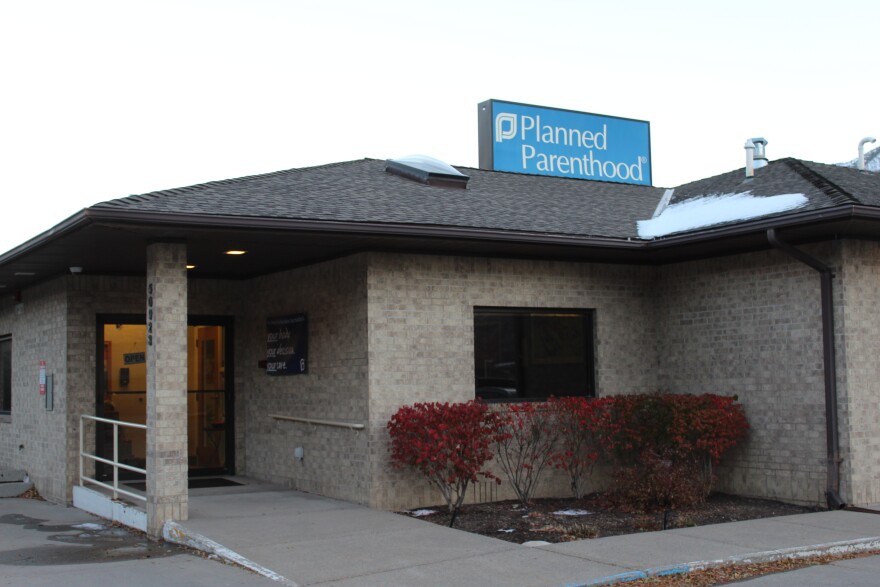Planned Parenthood of the Rocky Mountains has already been seeing an uptick in out-of-state abortion patients traveling to Glenwood Springs and other clinics across Colorado since Roe v. Wadewas overturned in 2022, and the numbers are expected to increase with the latest election results.
Abortion access was on the ballot in 10 states this election, including in Colorado, where just over 60% of voters passed Amendment 79, further protecting the right to an abortion by enshrining it in the state constitution.
The new amendment also lifted Colorado’s decades-old ban on state funds being used to pay for abortions, allowing government employees to get coverage for the procedure through their health insurance and opening the door for the state to extend Medicaid coverage for the procedure.
Nevada, Arizona, Montana, Maryland and New York also voted to strengthen existing rights, and Missouri overturned its near-total ban, but Florida, South Dakota and Nebraska voted to keep restrictions in place.
Colorado Secretary of State
A map of 2024 election results in Colorado on the Secretary of State website shows the breakdown of counties that voted for (in green) and against (in red) Amendment 79, which passed with just over 61% of the vote and enshrined abortion rights in the state constitution. Abortion access was on the ballot in 10 states this election.
An uncertain future for abortion providers
Adrienne Mansanares, president and CEO of Planned Parenthood of the Rocky Mountains, said the mixed results among states, on top of the reelection of former President Donald Trump, probably mean even more people will be traveling to states such as Colorado and New Mexico, where abortion is legal.
“I mean, just as we learned in 2016, we have to take this administration at their word. They promised that if they win that they are going to continue attacks on abortion care, contraception, gender-affirming care for our transgender folks, LGBTQ+ rights and so much more,” Mansanares said. “And so we are prepared to take them at their word. It’s so devastating to know that we’ve got another four years of divisive, hateful national rhetoric.”
The president-elect has claimed credit for his role in nominating three of the U.S. Supreme Court Justices who voted to overturn Roe v. Wade, but his stance on abortion during his recent campaign for a second term was mixed. Trump told voters he supports the rights of states to make decisions on abortion and said he would not push for a national ban, but he refused to say if he would veto such a ban if it crossed his desk as president.
With some states rolling back abortion protections and an increase in national anti-abortion rhetoric, Planned Parenthood of the Rocky Mountains has also seen a rise in the number of protests outside its clinics in Colorado and other states where the procedure is legal.
“In particular, we’re seeing more protesters that are traveling from out of state,” Mansanares said. “So, sadly, you can kind of imagine our patients that may be coming from as far away as Louisiana or Texas and traveling on those same roads, there are people who are coming to our health centers to protest their care.”


Eleanor Bennett
/
Aspen Journalism and Aspen Public Radio
People line up at the Pitkin County Library on Feb. 13 to sign a petition created by the statewide coalition Coloradans for Protecting Reproductive Freedom to get Amendment 79 on the November ballot. The amendment enshrined abortion rights into the state constitution and lifted Colorado’s decades-old ban on state funds being used to pay for abortions.
Out-of-state patients face high costs
Planned Parenthood of the Rocky Mountains, which has clinics in Colorado, New Mexico, Wyoming and southern Nevada, has received 12,500 out-of-state patients since the overturning of Roe v. Wade.
In Colorado, many of the 7,000 out-of-state patients in the past two years have traveled from Utah and Texas, but Planned Parenthood clinics have also seen people from states such as Wyoming, Idaho and Louisiana.
“Many patients from Texas and Louisiana and the southeast were traveling to Florida for care, and now the closest places for all of those folks in Florida and throughout the South to seek care is Illinois, North Carolina, Maryland and then us,” Mansanares said.
Although a majority of patients who travel to Colorado for abortion care visit clinics in Denver or other cities, the Planned Parenthood center in Glenwood Springs has seen a 58% increase in patients coming from out of state since Roe v. Wade was overturned.
According to Mansanares, the average cost of accessing a medication abortion is about $350, but many people who live in states with restrictions or bans that travel elsewhere for care have to pay triple that amount.
“They pay for transportation, for food, for child care,” she said. “If you think about lost wages, that may also be another $500 to $1,000, so it’s a significant financial burden on patients.”
This year, 50% of out-of-state patients who received care through the regional Planned Parenthood affiliate self-reported income at 150% or below the federal poverty line, and 21% of out-of-state patients self-reported their ethnicity as Spanish/Hispanic/Latinx.
“People who don’t have access to finances, or who are disproportionately experiencing life in poverty, will not receive abortion care, and that is, again, what we’ll continue to see for the next generation,” Mansanares said.
Planned Parenthood of the Rocky Mountains told Aspen Public Radio and Aspen Journalism that it does not allow or facilitate interviews with its local health care staff or patients due to increased safety, privacy and legal concerns, but Mansanares was able to share some examples of patients who recently traveled to the Glenwood Springs clinic for abortion care.
“One patient flew into Denver, rented a car, drove to Glenwood, received her care, and then just turned around, drove back to DIA and flew out that evening home to Louisiana,” Mansanares said. “And that, to me, is just a remarkable story of someone who’d never seen the mountains before, never been to the Rockies and traveled the long distance to come get health care.”
Another young couple traveled to the Glenwood Springs clinic on a Greyhound bus from Texas, a state where the Supreme Court recently ruled against more than 20 women who sued their government, saying they were harmed by the state’s near-total abortion ban.
Planned Parenthood of the Rocky Mountains provided the young couple with financial support to help cover the cost of things such as accommodations and food.
“We knew that we were helping them financially, but what we didn’t know is that they both sold their blood plasma to buy their bus tickets, which is just so shocking,” Mansanares said. “I mean, we knew they were leaving their community for the first time and we were able to get them some support, but these young adults were so determined to get the care that they needed.”


Eleanor Bennett
/
Aspen Journalism and Aspen Public Radio
The Planned Parenthood clinic in Glenwood Springs has seen a 58% increase in patients coming from out of state since Roe v. Wadewas overturned. Most out-of-state patients in Colorado are coming from Utah and Texas.
Providers offer financial assistance and prepare for future
Before the Dobbs v. Jackson ruling overturned Roe v. Wade, Planned Parenthood of the Rocky Mountains spent a little over $1 million each year in financial assistance to patients that need support with travel or couldn’t afford the cost of abortion care, but in the past two years, that has risen to about $9 million. In Colorado alone, the regional Planned Parenthood affiliate spent a total of $12.8 million in the two years after the Dobbs v. Jackson decision.
“We’ve never seen the level of increased need like we’re facing now, and that is unsustainable, like we just don’t have the funds to be able to cover that level of care,” Mansanares said. “I’m really glad that we’re able to continue providing support for travel or to subsidize their care, but we may have to cap it at 50% of the procedure, for example, or help with an airplane ticket, but not be able to help with the hotel room.”
In addition to its own financial assistance, Planned Parenthood has patient navigators who help people connect with other organizations that provide abortion care funds in Colorado and in other states.
Although Mansanares is concerned about an increase in patients traveling to states such as Colorado for abortion care, her team has also been preparing.
“We have been scenario planning with our legal team and our clinical teams for the past six months to be prepared for what may happen at the national level so that we can keep our doors open no matter what,” she said.
Such scenario planning includes security measures and preparing to defend Planned Parenthood clinics against lawsuits. Also, despite the U.S. Supreme Court’s recent rejection of a challenge against abortion pill accessibility, Planned Parenthood’s clinicians are preparing for the possibility of a future ban on abortion medications such as mifepristone.
“We could still provide abortion care just using one form of medication, misoprostol, which is clinically safe,” Mansanares said. “It’s a little less effective than the two-medication process that we use now, but that’s an example of how we’ve had to be ready for whatever comes at us.”
Despite potential challenges ahead, Mansanares is confident that Planned Parenthood, a nonprofit institution that has been around for more than 100 years, will continue to provide patients with abortions and a range of other care — from cancer screenings to HIV and STD testing — in the coming years.
“It’s hard to imagine, but we’ve seen worse. We’ve overcome a terrible shooting at one of our health centers where people literally died; we’ve seen cyber security attacks; people that have tried to harm our providers or our health centers. And the list goes on,” Mansanares said. “And no matter what’s come our way, we have always stood up for what’s right and always kept our doors open for our patients.”
This story was produced through a social justice reporting collaboration between Aspen Journalism and Aspen Public Radio.
Copyright 2024 Aspen Public Radio
Source link : http://www.bing.com/news/apiclick.aspx?ref=FexRss&aid=&tid=67472a73abc14fa8a21241ee8f413e11&url=https%3A%2F%2Fwww.kunc.org%2Fnews%2F2024-11-27%2Fplanned-parenthood-of-the-rocky-mountains-braces-for-increase-in-people-traveling-to-colorado-for-abortions&c=5023259642847991174&mkt=en-us
Author :
Publish date : 2024-11-27 00:16:00
Copyright for syndicated content belongs to the linked Source.











